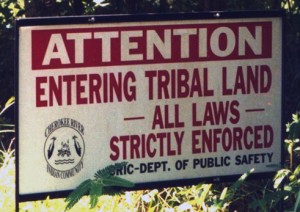By Joe Sexton
Recently, in State of New Mexico v. Sanchez, the New Mexico State Court of Appeals upheld the DUI conviction of a non-tribal defendant arrested by a tribal police officer on Indian lands in New Mexico. The defendant, on appeal, had challenged the authority of the tribal police officer to arrest him. At first blush, this seems to be a win for Indian Country and tribal sovereignty in general. Of course the end result is better than a ruling further eroding the minimal authority Tribal police presently retain in Indian Country after a disastrous line of federal court decisions, including the Supreme Court’s disastrous holding in Oliphant v. Suquamish Indian Tribe roughly 36 years ago.
 But if you dig into the New Mexico court’s decision enough to understand the reasoning underpinning its holding, the illusory nature of tribes’ sovereign power to police their own lands is revealed. The only reason preventing the New Mexico court from finding that the tribal police officer lacked the authority to arrest an impaired driver on Indian lands is the fact that the tribal officer had been deputized by the non-tribal county government. In other words, only through the permission of non-tribal entities—many of which are often openly hostile to tribal authority and jurisdiction—is a tribal police officer allowed to arrest a non-tribal person committing a crime in Indian Country. One line from the court of appeals’ opinion in particular reveals the hollow nature of the tribal police officer’s authority with respect to non-tribal criminal actors on Indian lands:
But if you dig into the New Mexico court’s decision enough to understand the reasoning underpinning its holding, the illusory nature of tribes’ sovereign power to police their own lands is revealed. The only reason preventing the New Mexico court from finding that the tribal police officer lacked the authority to arrest an impaired driver on Indian lands is the fact that the tribal officer had been deputized by the non-tribal county government. In other words, only through the permission of non-tribal entities—many of which are often openly hostile to tribal authority and jurisdiction—is a tribal police officer allowed to arrest a non-tribal person committing a crime in Indian Country. One line from the court of appeals’ opinion in particular reveals the hollow nature of the tribal police officer’s authority with respect to non-tribal criminal actors on Indian lands:
“The scope of Officer Vigil’s [the tribal police officer] authority depends on the authority given to him by the Santa Fe County Sheriff.”
When you combine the deep-seated racism and anti-tribal sentiment that has festered for generations in and around Indian Country and has infected non-tribal law enforcement, with the often rural nature of Indian reservations, and the court decisions crippling tribal law enforcement’s ability to protect communities situated in Indian Country, this recipe for calamity generally creates lawless havens for criminals and leads to problems of epidemic proportions.
The movement to stem violence against tribal women makes this painfully clear. According to Lynn Rosenthal, the White House Advisor on Violence Against Women, “Native American women suffer from violent crime at some of the highest rates in the United States.” Ms. Rosenthal notes that non-Indians constitute “more than 76 percent of the overall population living on reservations and other Indian lands” and, consequently, many of the “abusers of Native American women are non-Indian men. Thus, “non-Indian men who batter their Indian wives and girlfriends go unpunished” because of the jurisdictional limitations of tribal courts and law enforcement.
Even though Congress recently debated an “Oliphant fix” with respect to violence against women in particular, legislation regarding this problem should not be necessary, and violence against Native American women is not the only malignancy caused by Oliphant and its progeny. If sovereignty means anything, it means the inherent authority to protect the communities situated within a sovereign’s territory. But this authority has been stripped away, leaving Tribal law enforcement at the mercy of local jurisdictions if they want any authority to protect their communities from non-tribal criminals. As Justice Thurgood Marshall noted in his dissent to the Oliphant majority opinion:
"I agree with the court below that the ‘power to preserve order on the reservation . . . is a sine qua non of the sovereignty that the Suquamish originally possessed.’ . . . In the absence of affirmative withdrawal by treaty or statute, I am of the view that Indian tribes enjoy, as a necessary aspect of their retained sovereignty, the right to try and punish all persons who commit offenses against tribal law within the reservation.”
Put another way, the authority of sovereign Indian tribes to arrest and prosecute non-Indians who decide to commit crimes on Indian lands is inherent, and absent legislation or a Treaty to the contrary, no court has the legitimate authority under our system of law to simply erase that inherent authority. So in the end, it’s a good thing that the New Mexico Court of Appeals did not expand upon Oliphant and further hamstring tribal law enforcement operating within New Mexico. But Officer Vigil’s authority on tribal lands does not, and should not, depend on whether Santa Fe County decides to cross-deputize him or not.
Joe Sexton is Of Counsel with Galanda Broadman, PLLC, and practices out of Yakima, Washington. Joe’s practice focuses on tribal sovereignty issues, including land and environmental issues, economic development matters, and complex Indian Country litigation.














 We do not prosecute disenrollment actions; we defend against them.
Our sworn duty is to ensure that fundamental human rights and guaranteed civil rights are honored during any disenrollment actions. Too frequently, they are not.
We do not prosecute disenrollment actions; we defend against them.
Our sworn duty is to ensure that fundamental human rights and guaranteed civil rights are honored during any disenrollment actions. Too frequently, they are not. This year’s lineup of speakers include:
This year’s lineup of speakers include:



